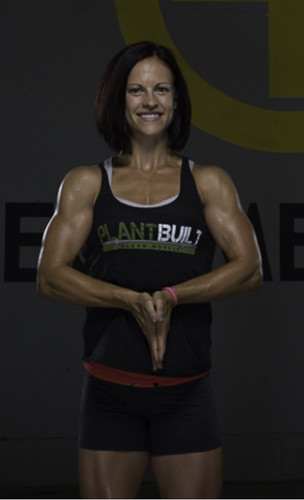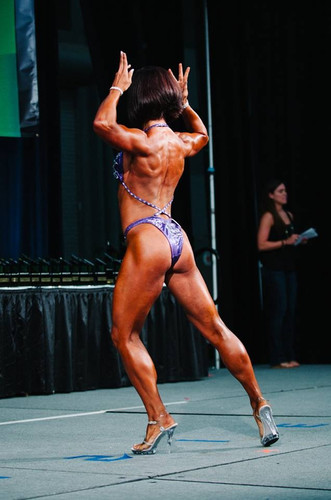Leigh-Chantelle
What has benefited you the most from being a vegan?
What does veganism mean to you?
How often do you (need to) train?
What sports do you play?
What are you strengths as a vegan athlete?
What is your biggest challenge?
Are the non-vegans in your industry supportive or not?
Are your family and friends supportive of your vegan lifestyle?
What is the most common question/comment that people ask/say when they find out that you are a vegan and how do you respond?
Who or what motivates you?
Losing weight – For me, it is making sure I’m not eating too much right before bedtime and reducing the amount of fats I’m eating - I like nut butters and coconut oil too much. But, also spacing food out throughout the day so I’m never too hungry or too full and making sure I eat when I’m hungry instead of letting my appetite take over.
Maintaining weight – One of the easiest ways to maintain weight is to not obsess about it! Enjoy exercise and enjoy eating, making sure to only eat treats in moderation. Trying to restrict too much leads to overeating and all sorts of added stress that won’t do your efforts any good.
Improving metabolism – As I said before, don’t get too full or too hungry, as well as drink plenty of water and add high intensity interval training into your program.
How do you promote veganism in your daily life?
How would you suggest people get involved with what you do?
VLV Articles
Erin Fergus is a personal training instructor at Greenville Technical College in Greenville, South Carolina, and member of Team PlantBuilt vegan bodybuilding team competing in bodybuilding and physique divisions. She is also Lead Columnist for Definition for Ladies online magazine and regular contributor to MyMetaWorld. You can follow her journey as a self-proclaimed “girly bodybuilder” on Facebook, Twitter or Instagram.
 Photo by Donovan Jenkins
Photo by Donovan Jenkins
Why Vegan?
How and why did you decide to become a vegan?
How and why did you decide to become a vegan?
I grew up in the country surrounded by animals and raised by parents who taught me to love animals and appreciate nature. My diet was not meat-heavy to begin with, but I decided to stop eating beef, chicken, pork and turkey after seeing PETA posters and demonstrations on a vacation to Washington, DC, right after high school graduation. I took another step by eliminating milk, cottage cheese, fish and eggs in October 2007, and I always said I couldn’t go 100% because it was expensive and I didn’t have the resources. I realized that those were just excuses, and I made a full commitment in March 1, 2013. I have always loved all animals, and my choice is rooted in animal rights, but the undeniable health benefits are an added perk.
What has benefited you the most from being a vegan?
I am easily able to complete my heavy training load and recover more quickly from it. I can maintain a lower body fat percentage year round and do not have to go to the extreme levels that most non-vegan bodybuilders have to do to prepare for a show, and I never, ever get sick!
What does veganism mean to you?
It means caring for all animals and the environment and trying to do as little as possible to harm or exploit either. I am becoming more ethically driven. I eliminated palm oil this year, and I try to stay informed on those types of issues so I can educate myself and others. I view myself as a walking billboard for the lifestyle, so I do my best to let the fact that I’m incredibly healthy and happy speak for itself. I am cautious to spread the message in a caring and educational manner instead of a condescending one. In the end, it’s all about compassion for all life.
Training
What sort of training do you do?
Training
What sort of training do you do?
I train for bodybuilding and physique competitions, although I have also dabbled in powerlifting and strong man style training. I have a background in endurance running and triathlon, as well as dance and gymnastics.
How often do you (need to) train?
I lift weights every day, and I do some form of cardio at least five days a week. I choose not to take a rest day because I enjoy the mental challenge so much, and I meticulously plan my training splits to make sure no muscles get over-trained. I also use stretching, foam rolling and massage for injury prevention.
Do you offer your fitness or training services to others?
I do offer in person and online services, and I can be found in the Vegan Health & Fitness Magazine directory.
What sports do you play?
I grew up playing basketball and softball. I don’t play any organized sports now, but I have recently completed adventure races including the Tough Mudder and Spartan Beast and taken trapeze and silks classes at a circus school.
Strengths, Weaknesses & Outside Influences
What do you think is the biggest misconception about vegans and how do you address this?
Strengths, Weaknesses & Outside Influences
What do you think is the biggest misconception about vegans and how do you address this?
A lot of people think vegans are deathly pale, anemic, sickly and weak. I have clear, smooth, olive toned skin, thick shiny hair, and have been told several times, “You look so healthy…for a vegan” or “You are the healthiest looking vegan I’ve seen.” I hope one day that people will say, “You look so healthy” and leave it at that.
What are you strengths as a vegan athlete?
I add strength and muscle very easily. I went vegan and began my bodybuilding journey at the same time. My body looks drastically different from just a year ago, and all my gains can be attributed to plant power. This makes an even more effective argument for vegan bodybuilding because naysayers often ask how much of the muscle was gained before the athlete went vegan.
What is your biggest challenge?
One of my biggest mental and emotional challenges is that I live in the South (of USA) and don’t have a vegan fitness community here. Thank goodness it is thriving online. My biggest physical challenge is that I have a naturally thick waist and compete in a sport that favors narrow waists and bodies that create an “X” shape. I have to work that much harder to create a wider upper back and thicker legs to create the illusion of a smaller waist. I also have several old injuries to my right leg that I am constantly rehabbing while I train.
Are the non-vegans in your industry supportive or not?
Meat is “the way” in South Carolina, but I have had mixed reactions here. Females tend to be more supportive than do males, and all the women who I went to posing clinics with last year before my figure competition thought it was fascinating. I have even connected with some vegetarians who compete, and I encourage them to make the transition.
Are your family and friends supportive of your vegan lifestyle?
My parents have always been my number one fans. Although they do not follow the same lifestyle, their support of my choices grows every year. I have taken over more of the holiday cooking so I can expose extended family to my delicious food. I teach personal training at a community college, and my students are some of my biggest supporters. Most of them had no idea what a vegan was, but I have inspired them to incorporate more plant-based eating and have debunked all the myths that plants can’t build muscle. They also love the vegan cupcakes and other treats that I bring them.
What is the most common question/comment that people ask/say when they find out that you are a vegan and how do you respond?
It used to be “Where do you get your protein?” but that one has died down. Recently it’s more, “But cows make milk anyway/bees make honey anyway,” and I use that as an opportunity to educate them on factory farming and other forms of animal exploitation. Sometimes I’m shocked at some of the basic knowledge people lack. For example, almost every time I talk about eggs I find out that some people don’t know that chickens lay unfertilized eggs every day and that not every egg turns into a chicken. I’m also saddened that people think that claims such as “free range” and “grass fed” eliminates the cruelty. I believe that unless every animal that dies is petted, hugged, or loved on to death, we have a problem.
Who or what motivates you?
Right now I am obsessed with adding strength and muscle for the animals. I know that the more size I can gain and the more weight I can lift, the more seriously vegan bodybuilding will be taken. I wait for that moment when I am on stage and the announcer reveals that I’m vegan. I love wearing vegan gear and striking up conversations with it. I am moving into the most intense stage of my contest prep, and (as morbid as this is), I am fueled by animal cruelty. I think about how much is taken away from so many animals, and I think about how they never have a choice. I have a choice, and I choose to put my 100% into my training and diet. It’s so much more motivating and meaningful to know that I am training to save the animals and to change people’s perspectives instead of just to look “perfect” one night on a stage.
 Photo by Donovan Jenkins
Photo by Donovan Jenkins
 Photo by Donovan Jenkins
Photo by Donovan JenkinsFood & Supplements
What do you eat for:
Breakfast – Usually gluten-free oats with banana and peanut or almond butter, and then my “second breakfast” is a protein shake and grapefruit.
Lunch – Sweet potato, tofu and green veggies such as kale, broccoli, lima beans or Brussels sprouts sprinkled with nutritional yeast and spritzed with Braggs liquid aminos.
Dinner – “First dinner” is quinoa and Textured Vegetable Protein (TVP) with green veggies. “Second dinner” is brown rice, tofu, avocado and more green stuff, usually a blend of spinach, mushrooms and onion with black pepper.
Snacks (healthy & not-so healthy) – Berries blended with nuts and protein powder to make a protein pudding is my favorite last meal of the night, but I also love experimenting with making my own variations of hummus and pesto.
What is your favourite source of:
Protein – My favorite shakes are made with Raw Fusion or Plant Fusion protein powders because I like the fun flavors of banana nut, chocolate peanut fudge, cookies ‘n cream and chocolate raspberry, but I also love tofu, tempeh and quinoa.
Calcium – Adora dark chocolate supplement is my go-to nightly treat, but tofu and green veggies also have calcium.
Iron – I love pepitas and usually add them to my aforementioned spinach/mushroom/onion blend.
What foods give you the most energy?
What do you eat for:
Breakfast – Usually gluten-free oats with banana and peanut or almond butter, and then my “second breakfast” is a protein shake and grapefruit.
Lunch – Sweet potato, tofu and green veggies such as kale, broccoli, lima beans or Brussels sprouts sprinkled with nutritional yeast and spritzed with Braggs liquid aminos.
Dinner – “First dinner” is quinoa and Textured Vegetable Protein (TVP) with green veggies. “Second dinner” is brown rice, tofu, avocado and more green stuff, usually a blend of spinach, mushrooms and onion with black pepper.
Snacks (healthy & not-so healthy) – Berries blended with nuts and protein powder to make a protein pudding is my favorite last meal of the night, but I also love experimenting with making my own variations of hummus and pesto.
What is your favourite source of:
Protein – My favorite shakes are made with Raw Fusion or Plant Fusion protein powders because I like the fun flavors of banana nut, chocolate peanut fudge, cookies ‘n cream and chocolate raspberry, but I also love tofu, tempeh and quinoa.
Calcium – Adora dark chocolate supplement is my go-to nightly treat, but tofu and green veggies also have calcium.
Iron – I love pepitas and usually add them to my aforementioned spinach/mushroom/onion blend.
What foods give you the most energy?
I have felt better after adding at least two cups of kale into my diet and also love the natural energy from bananas.
Do you take any supplements?
For daily vitamins, I take a multivitamin, Iron, B12, calcium, magnesium and CoQ10 for headache prevention, and turmeric and glucosamine with MSM for joint health. I take CLA and L-carnitine to help me lean out for my show, and I also take creatine at pre-workout, and glutamine when I am training intensely.
Advice
What is your top tip for:
Gaining muscle – Lift HEAVY! Go for weights that you can only lift five to eight times, and make sure to increase to the next weight up when those become easy. I also really like to use drop sets, which is stripping off weight when I have reached failure and making myself continue with more reps at a lighter weight. Increasing pyramids, which is lifting with a moderate weight to failure and then increasing the weight for fewer reps. Make sure to take in complex carbohydrates and protein after a workout to begin recovery and repair the tissues.
Advice
What is your top tip for:
Gaining muscle – Lift HEAVY! Go for weights that you can only lift five to eight times, and make sure to increase to the next weight up when those become easy. I also really like to use drop sets, which is stripping off weight when I have reached failure and making myself continue with more reps at a lighter weight. Increasing pyramids, which is lifting with a moderate weight to failure and then increasing the weight for fewer reps. Make sure to take in complex carbohydrates and protein after a workout to begin recovery and repair the tissues.
Losing weight – For me, it is making sure I’m not eating too much right before bedtime and reducing the amount of fats I’m eating - I like nut butters and coconut oil too much. But, also spacing food out throughout the day so I’m never too hungry or too full and making sure I eat when I’m hungry instead of letting my appetite take over.
Maintaining weight – One of the easiest ways to maintain weight is to not obsess about it! Enjoy exercise and enjoy eating, making sure to only eat treats in moderation. Trying to restrict too much leads to overeating and all sorts of added stress that won’t do your efforts any good.
Improving metabolism – As I said before, don’t get too full or too hungry, as well as drink plenty of water and add high intensity interval training into your program.
How do you promote veganism in your daily life?
I wear slogan shirts when I can (I practically lived in my PlantBuilt vegan muscle team hoodie this Winter) because I know they are good conversation starters. I try to keep a lot of positive things on my Social Media channels, such as showing how delicious my food is (I have a “food porn” album on my FaceBook page) and commenting about how wonderful my health and performance are as a vegan.
How would you suggest people get involved with what you do?
If someone wants to compete in any form of bodybuilding, then he or she needs to figure out which division best matches his or her physique. Connect with other vegan competitors and possibly find a vegan trainer or coach, even if the training has to be online. Watch bodybuilding shows in person or through videos to see what it really looks like. Set a goal competition date in your mind and start training for it. You can wait farther along in the journey to pay the registration fee, buy a suit and do all the other required things, so you can always change your mind without losing money. Lastly, if you want to do figure, physique or bodybuilding, get off the cardio machines, lift heavy weights, and eat whole foods!
Stay tuned for upcoming interviews with other Vegan Athletes, Fitness Fanatics and Exercise Enthusiasts by Subscribing via RSS.
The Book is Coming Soon!
Leigh-Chantelle is an International Speaker & Consultant; Author, Singer/Songwriter and Blogger.
Latest Photos
© Leigh-Chantelle Site by
DesignVoodoo.com|hosted green| mobile compatible|Google Translation
mobile compatible|Google Translation
 This work is licenced under a Creative Commons Attribution-NonCommercial-NoDerivs 3.0 Australia Licence
This work is licenced under a Creative Commons Attribution-NonCommercial-NoDerivs 3.0 Australia Licence
 This work is licenced under a Creative Commons Attribution-NonCommercial-NoDerivs 3.0 Australia Licence
This work is licenced under a Creative Commons Attribution-NonCommercial-NoDerivs 3.0 Australia Licence
